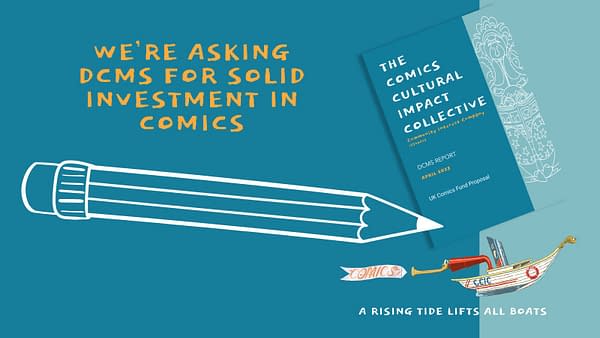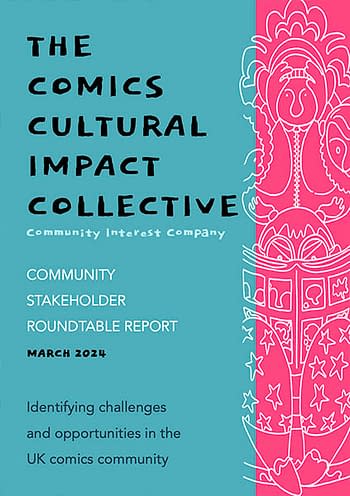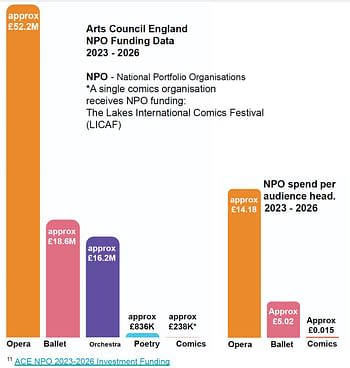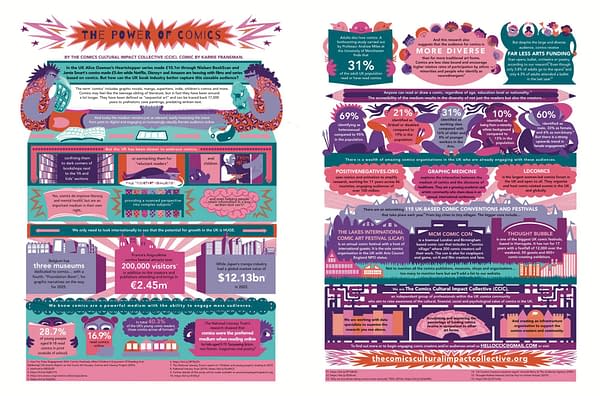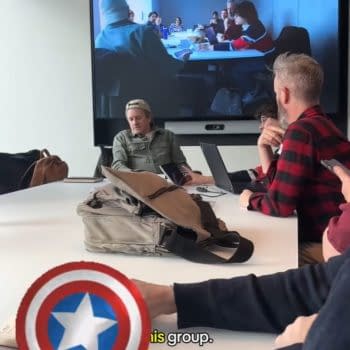Posted in: Comics, Current News | Tagged: charlie adlard, uk
Call For British Government To Invest £1.5 Million In UK Comics Fund
Call for the British Government to invest £1.5 Million in the UK Comics Fund... considering how much is spent on ballet and opera...
Article Summary
- UK Comics Fund seeks £1.5M to boost comics industry growth.
- Proposal aims to create jobs, IP, and economic impact.
- Comics attract diverse, young, and marginalised voices.
- Investment promises £3-£5 return per £1 spent by UK.
Right now, the Comics Cultural Impact Collective's UK Comics Fund is submitting a proposal to the UK government's Department for Digital, Culture, Media & Sport or DCMS, for one and a half million pounds of government funds to be invested into the UK comics industry. It can be read in full here – UK Comics Fund Proposal. Towards the end, you'll see the pages of co-signers, and if you would like to join them, you can co-sign the proposal yourself right here. They have a signature deadline for 5 pm BST on the 23rd of April and would like to gather as many signatures as possible.
Hannah Berry, ex-Comics Laureate and CCIC co-director, said "This fund is about levelling the playing field. Comics already punch above their weight culturally – now it's time they did so economically. With the right support, we can turn a hugely talented but under-resourced community into a sustainable, revenue-generating industry. It's a chance to retain UK-owned IP, boost exports and create real jobs. Most importantly, it shows that Britain values – and supports – its creators."
Rhiannon Griffths MBE, founder of Comics Youth and also a CCIC co-director, added: "The UK Comics Fund is a smart, strategic investment: it creates jobs, builds IP, and unlocks the economic potential of an underfunded but high-impact sector. But more than that, it sends a powerful message. Comics have always been a space for working-class, marginalised and young voices – this fund turns that energy into opportunity, sustainability and growth. It's not just good economics – it's cultural justice."
But what is the proposal? Well, I'm glad you asked. The Comics Cultural Impact Collective (CCIC), an independent collective of professionals from the UK comics community that aims to amplify awareness of comics' cultural and economic impact, is calling for £1.5 million of funding to make the most of the "untapped potential of the comics industry". And have released a report based on extensive consultation with comics creators, booksellers, events, publishers and agents to back up its call for the funding, which the organisation says would turn the comics industry into a "thriving cultural sector for the UK". And that it would deliver a £3 to £5 return for every £1 invested by the UK government. And they have gotten economists to back this up and everything. Inspired by the UK Games Fund, the CCIC says it would provide "robust opportunities for comics makers and businesses… unleashing the potential of comics as a valuable component of the UK's creative industry". Its executive summary reads:
"The Fund will provide direct support to creators and publishers, alongside capacity-building for the sector's delivery infrastructure. It will be independently evaluated, scalable, and built with equity and sustainability at its core. The Fund is projected to generate £2M – £5M in economic activity annually, based on conservative modelling from comparable creative funding schemes. It will support the creation of 250 – 300 jobs each year (direct and indirect) and fund 60 -100 new comics publications annually. Return on investment is expected to be £3 – £5 per £1 of public funding — aligning with the strong ROI shown by the UK Games Fund and Arts Council England development grants.
- Jobs created 250 – 300 (direct + indirect)
- New comics published 60 – 100 titles
- Revenue growth £2M – £5M
- Export growth 10 – 20% increase in rights sales
- Return on investment £3 – £5 per £1 invested
"This is not a call for recurring subsidy, but a launchpad investment to unlock new jobs, IP, and impact from a sector with untapped potential — an approach proven to work across Games, Literature, and Screen. Its sustainability model includes:
- IP Retention: enabling creators to monetise their work across multiple revenue streams
- Capacity Building: training in business skills, export strategy, and IP literacy
- The Comics Cultural Impact Collective (CCIC) is requesting a £1.5 million investment over two years to pilot the UK Comics Fund — a strategic intervention to grow the UK's comics sector, modelled on the successful UK Games Fund.
- Ecosystem development: Creating an infrastructure hub for talent, mentorship, and collaboration
- Reinvestment strategy: encouraging successful grantees to co-invest in future projects or talent
- Green practices: prioritising sustainable print and digital-first publishing formats. These pillars ensure the Fund contributes not only to immediate outcomes but to the creative and commercial future of the UK's comics industry
"Strategic alignment with DCMS goals
- The UK Comics Fund directly supports DCMS priorities by:
Stimulating economic growth through cultural investment.- Enhancing UK soft power and exports
- Supporting young people, freelancers, and diverse voices
- Aligning with net zero goals through environmentally conscious creative practice
- Delivering measurable returns with lean, scalable infrastructure
"This is not just arts funding — it's a future-facing investment in the UK's next creative growth sector. It's small in cost, large in outcome,
and ready to deliver results from year one."
And along the way it highlights some memorable facts:
- "a third of creators are working class compared to one in ten in the rest of the arts, and creators and readers are more likely to be neurodivergent, disabled and LGBTQ+ than the general population… There is a growing body of evidence that this artform attracts a large number of neurodiverse creators and audiences"
- "funding is £14.18 per head for opera audiences… and £5.02 for ballet but for comics audiences it is 1.5p per head. When younger audiences are factored in, the spend is less than 0.5p per head… Arts Council England's emphasis on supporting opera, ballet, theatre and orchestras has led to substantial funding allocations for these genres, whereas emerging artforms such as comics receive comparatively little support, despite an exponential growth in public interest and accessibility… "
- "twice as many young people who read comics enjoy reading, compared to those who don't read comics in their free time (58.6% vs 33.1%)…. 40.3% of young people read comics at least once a month. At a time when reading is declining, comic book engagement is increasing"
- "information delivered in a comic format— as shown by research by Sheffield Hallam3 — is proven to be more impactful long-term, fostering over six times the retention levels of information compared to text alone."
- "the average income from comics in 2018-19 was £10,299, with 87% of creators supplementing their income through other means"
- "much of the infrastructure that helps artists reach audiences, generate income streams and employment — and thus bring £124bn to the UK economy — simply does not exist for comics due to historic underfunding and outdated biases."
- "The main body for arts funding in the UK is not currently equipped to support the comics industry at the scale required in order to maximise the potential benefits."
- Alice Oseman's HEARTSTOPPER made over £18m in the UK alone. Jamie Smart's BUNNY VS MONKEY comics have made over £11m. Charlie Adlard's THE WALKING DEAD is globally a $2bn comic, streaming, games and merchandising franchise
The fund proposes £1 million allocated to grants for early-stage ideation and advanced project completion in both comic creation and publisher infrastructure, and £500,000 dedicated to addressing the comics skills shortage and strengthening distribution infrastructure. This will include "small grants to help creators develop and prototype concepts, create polished samples, and prepare market-ready pitches, overseen by CCIC. The offerings would include emerging technology grants relating to comics: funding for projects incorporating VR, AR, and interactive elements would attract younger audiences and increase digital engagement, keeping comics relevant to the next generation". And proposed 25-50 grants of £5,000 to £10,000 each.
The report has so far been supported by Charlie Adlard, Dave Gibbons, Posy Simmonds, Alison Sampson, Jamie Smart, Emma Vieceli, the Beano, the Cartoon Museum, DACS, the Society of Authors, the National Literacy Trust, the Royal Society of Literature, Thought Bubble Festival, The Wellcome Trust Collections and LDComics, among others. Oh, and me too, why not? You can join me here.


